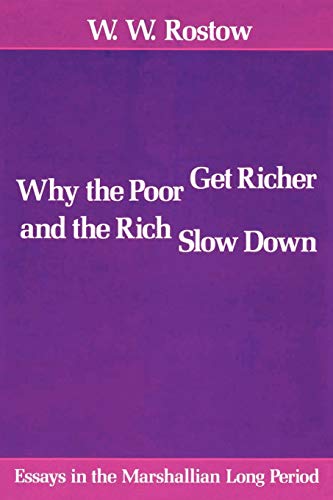All books / Book
Why the Poor Get Richer and the Rich Slow Down: Essays in the Marshallian Long Period

| Full title: | Why the Poor Get Richer and the Rich Slow Down: Essays in the Marshallian Long Period |
|---|---|
| ISBN: | 9780292729636 |
| ISBN 10: | 0292729634 |
| Authors: | |
| Publisher: | University Of Texas Press |
| Num. pages: | 394 |
| Binding: | Paperback |
| Language: | en |
| Published on: | 1980 |
Read the reviews and/or buy it on Amazon.com
Synopsis
Bearing on fundamental issues of economic theory, history, and public policy, this volume elaborates and goes beyond themes enunciated in W. W. Rostow’s previous works. The eight essays presented here are unified by the author’s insistence that neo-Keynesian and neoclassical theory are an inadequate basis for economic analysis and policy prescription. Changes in technology and in the supply of energy, food, and raw materials, he contends, must be taken into account. The scale and character of the investments required to respond to these changes link his analysis back to conventional income analysis. Rostow outlines in several contexts the framework for a general, disaggregated theory of production and prices that meets this criterion.
The theoretical and historical essays include a review and unification of various long-cycle theories; a formal mathematical model of the Kondratieff cycle; a review of theories relating technology and the price system, including Rostow’s own formulation of the appropriate linkage; a lengthy analysis of the pre-1914 relation between money and prices, including a detailed critique of modern monetarist interpretations; and an analysis of the proposition that economic growth assumes an S-shaped path of acceleration and deceleration.
The policy essays include an examination of the links between energy-related investment, full employment, and patterns of regional development in the United States; the discussion of an appropriate framework and procedure for North-South international economic negotiations; and the text of a 1965 talk on inflation that touches on the relations among economics, economists, and the performance of societies as a whole.